- Browse
- Sql
SQL Courses
SQL courses can help you learn database design, data manipulation, query optimization, and data retrieval techniques. You can build skills in writing complex queries, managing relational databases, and ensuring data integrity. Many courses introduce tools like MySQL, PostgreSQL, and Microsoft SQL Server, demonstrating how to use these platforms for data analysis and reporting. You'll also explore key topics such as joins, indexing, and transaction management, which are vital for effective data management and analysis.
Popular SQL Courses and Certifications
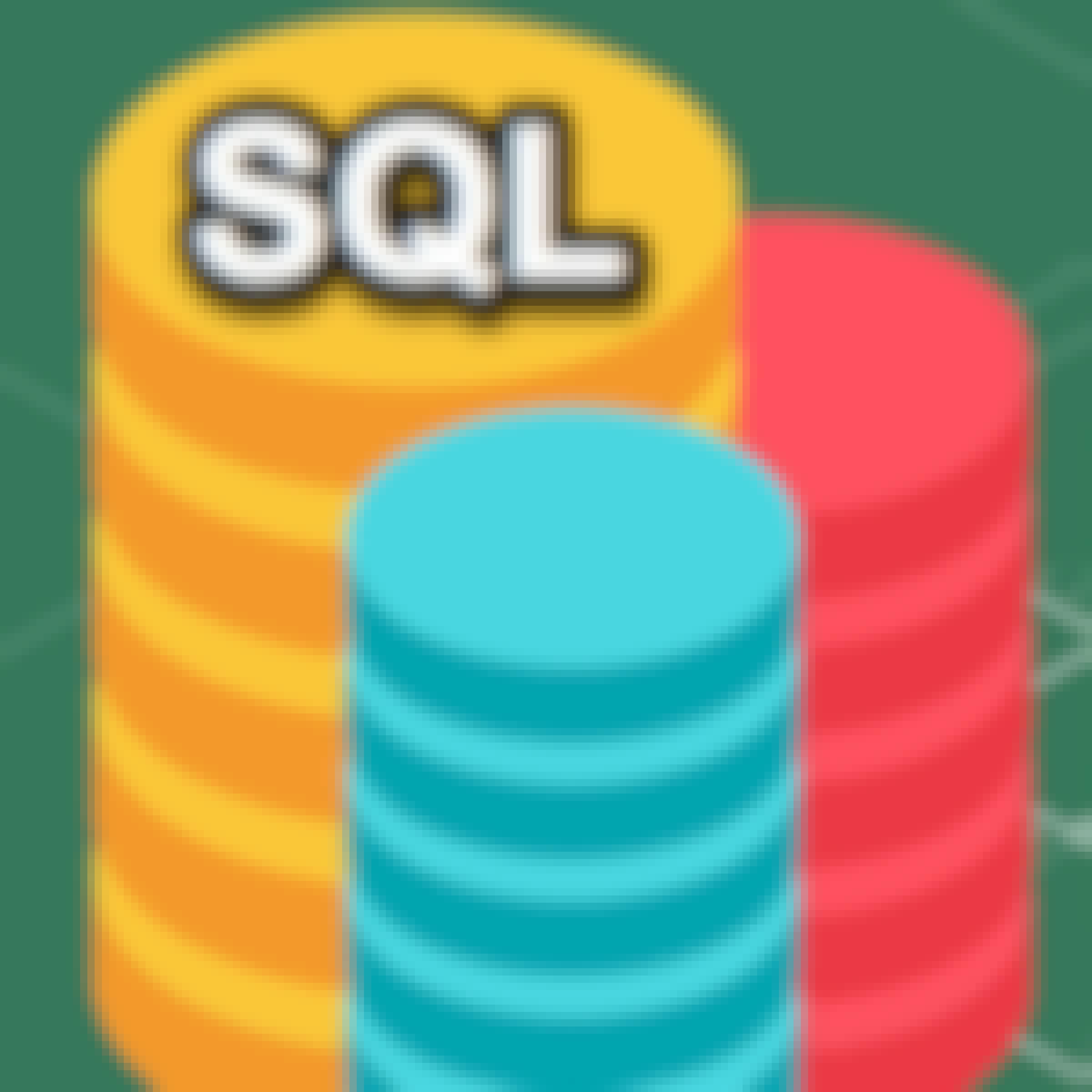 Status: Free TrialFree Trial
Status: Free TrialFree TrialSkills you'll gain: SQL, Relational Databases, Stored Procedure, Databases, Query Languages, Jupyter, Data Manipulation, Data Analysis, Pandas (Python Package), Transaction Processing, Python Programming
4.7·Rating, 4.7 out of 5 stars23K reviewsBeginner · Course · 1 - 3 Months
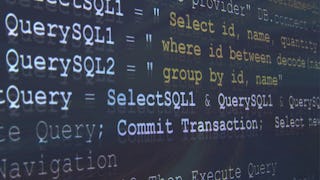 Status: Free TrialFree TrialU
Status: Free TrialFree TrialUUniversity of California, Davis
Skills you'll gain: Data Governance, SQL, Data Management, Data Quality, Database Design, Query Languages, Data Literacy, Data Manipulation, Data Modeling, Relational Databases, Data Science, Databases, Data Analysis, Data Transformation
4.6·Rating, 4.6 out of 5 stars17K reviewsBeginner · Course · 1 - 4 Weeks
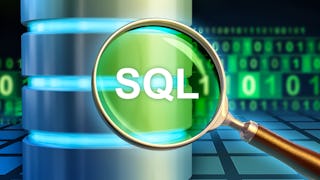 Status: Free TrialFree Trial
Status: Free TrialFree TrialSkills you'll gain: SQL, Relational Databases, Microsoft SQL Servers, MySQL, Query Languages, Database Systems, Databases, Database Management, Stored Procedure, IBM DB2, Data Manipulation, Data Analysis, Transaction Processing
4.7·Rating, 4.7 out of 5 stars687 reviewsBeginner · Course · 1 - 3 Months
 Status: Free TrialFree TrialM
Status: Free TrialFree TrialMMicrosoft
Skills you'll gain: Microsoft SQL Servers, SQL, Transact-SQL, Databases, Relational Databases, Data Transformation, Data Manipulation, Query Languages, Generative AI, Data Analysis
4.6·Rating, 4.6 out of 5 stars166 reviewsBeginner · Course · 1 - 4 Weeks
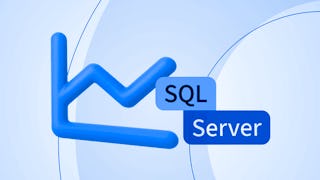 Status: Free TrialFree TrialM
Status: Free TrialFree TrialMMicrosoft
Skills you'll gain: Stored Procedure, Star Schema, Microsoft SQL Servers, Database Design, Relational Databases, Data Integrity, Data Integration, SQL, Transaction Processing, Power BI, Data Warehousing, Database Management, Transact-SQL, Data Maintenance, Databases, Query Languages, Database Architecture and Administration, Performance Tuning, Database Systems, Data Management
4.5·Rating, 4.5 out of 5 stars205 reviewsBeginner · Professional Certificate · 3 - 6 Months
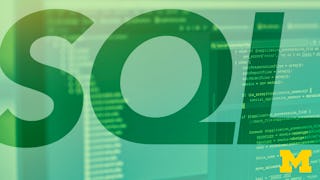 Status: Free TrialFree TrialU
Status: Free TrialFree TrialUUniversity of Michigan
Skills you'll gain: Database Design, SQL, MySQL, Relational Databases, Databases, Data Modeling, Development Environment, PHP (Scripting Language), Software Installation
4.8·Rating, 4.8 out of 5 stars5.5K reviewsIntermediate · Course · 1 - 4 Weeks
What brings you to Coursera today?
 Status: Free TrialFree TrialC
Status: Free TrialFree TrialCCorporate Finance Institute
Skills you'll gain: SQL, Databases, Data Manipulation, Data Analysis, Data Cleansing, Relational Databases, Data Access, Data Synthesis, Query Languages, Data Warehousing, Data Transformation
4.8·Rating, 4.8 out of 5 stars67 reviewsBeginner · Course · 1 - 3 Months
 Status: Free TrialFree TrialU
Status: Free TrialFree TrialUUniversity of California, Davis
Skills you'll gain: Data Governance, Presentations, SQL, Apache Spark, Distributed Computing, Data Management, Descriptive Statistics, Data Lakes, Data Storytelling, Peer Review, Exploratory Data Analysis, Data Quality, Data Pipelines, JSON, Statistical Analysis, Data Modeling, Performance Metric, Data Analysis, Complex Problem Solving, Data Visualization
4.6·Rating, 4.6 out of 5 stars17K reviewsBeginner · Specialization · 3 - 6 Months
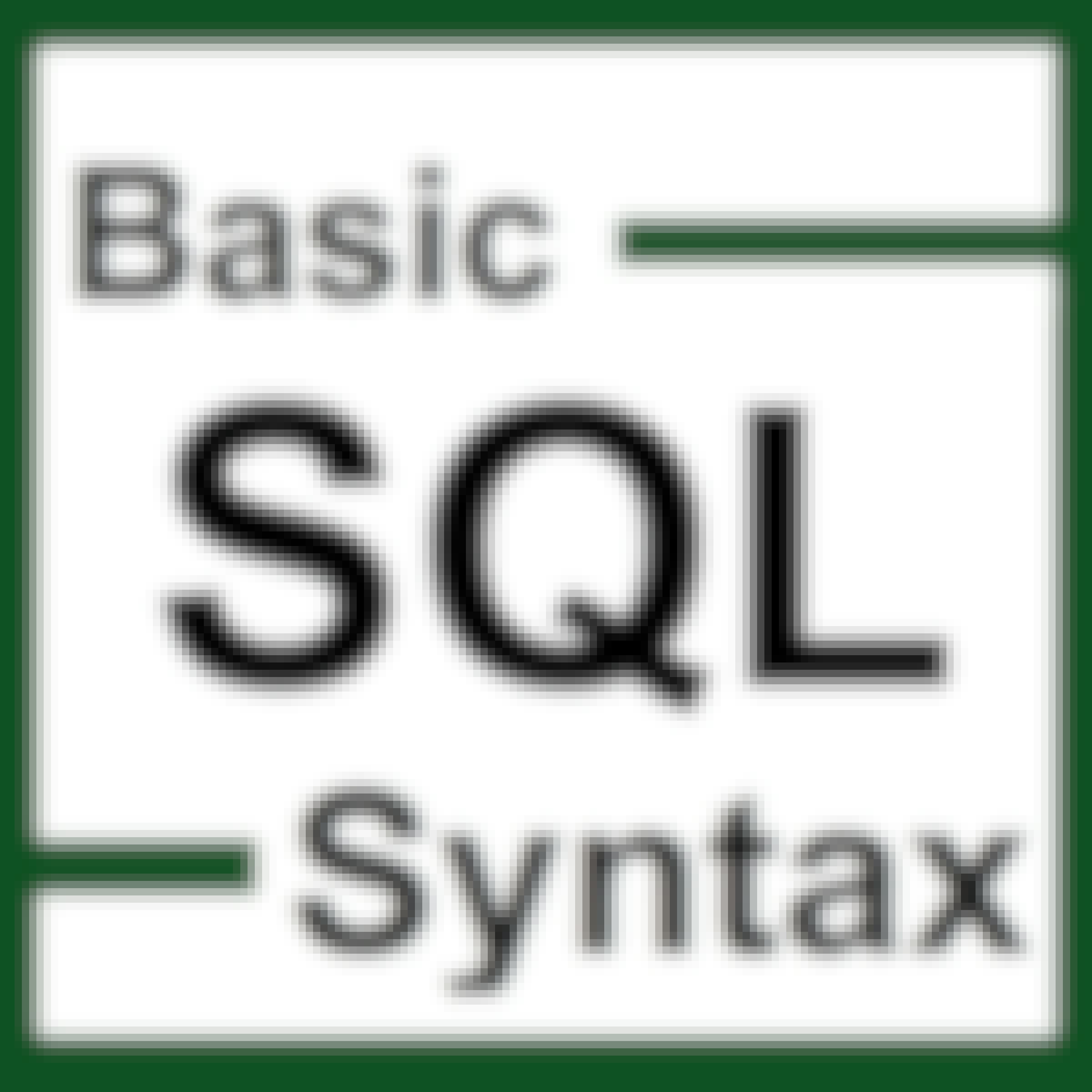 C
CCoursera
Skills you'll gain: SQL, Query Languages, Data Access, Relational Databases, Data Manipulation
4.7·Rating, 4.7 out of 5 stars334 reviewsBeginner · Guided Project · Less Than 2 Hours
 Status: Free TrialFree Trial
Status: Free TrialFree TrialSkills you'll gain: Bash (Scripting Language), Operating Systems, File Systems, Linux Commands, Linux, SQL, Unix, Database Management, Command-Line Interface, Relational Databases, Authorization (Computing), Authentications, User Accounts
4.8·Rating, 4.8 out of 5 stars6.1K reviewsBeginner · Course · 1 - 4 Weeks
 Status: Free TrialFree TrialU
Status: Free TrialFree TrialUUniversity of Michigan
Skills you'll gain: Stored Procedure, NoSQL, Database Design, Database Architecture and Administration, SQL, Relational Databases, Cloud Applications, PostgreSQL, Database Management Systems, Data Store, Databases, Database Theory, Data Modeling, JSON, Database Management, Query Languages, Cloud Deployment, Text Mining, Database Systems, Natural Language Processing
4.7·Rating, 4.7 out of 5 stars1.4K reviewsIntermediate · Specialization · 3 - 6 Months
 Status: Free TrialFree TrialStatus: AI skillsAI skillsG
Status: Free TrialFree TrialStatus: AI skillsAI skillsGGoogle
Skills you'll gain: Data Storytelling, Rmarkdown, Data Literacy, Data Visualization, Data Presentation, Data Ethics, Data Cleansing, Data Validation, Ggplot2, R (Software), Tableau Software, Sampling (Statistics), Presentations, Spreadsheet Software, Data Analysis, LinkedIn, Object Oriented Programming (OOP), Data Structures, Interviewing Skills, Applicant Tracking Systems
Build toward a degree
4.8·Rating, 4.8 out of 5 stars177K reviewsBeginner · Professional Certificate · 3 - 6 Months
In summary, here are 10 of our most popular sql courses
- Databases and SQL for Data Science with Python: IBM
- SQL for Data Science: University of California, Davis
- SQL: A Practical Introduction for Querying Databases: IBM
- SQL Foundations: Microsoft
- Microsoft SQL Server: Microsoft
- Introduction to Structured Query Language (SQL): University of Michigan
- SQL Fundamentals for Data Analysts: Corporate Finance Institute
- Learn SQL Basics for Data Science: University of California, Davis
- Understanding Basic SQL Syntax : Coursera
- Tools of the Trade: Linux and SQL: Google
Frequently Asked Questions about Sql
SQL, or Structured Query Language, is a standardized programming language used to manage and manipulate relational databases. It is essential because it allows users to create, read, update, and delete data efficiently. SQL is the backbone of data management in various industries, enabling organizations to make data-driven decisions, streamline operations, and enhance customer experiences. Understanding SQL is crucial for anyone looking to work with data, as it provides the foundational skills needed to interact with databases effectively.
With SQL skills, you can pursue various job roles in the tech and data sectors. Common positions include Database Administrator, Data Analyst, Data Scientist, Business Intelligence Analyst, and Software Developer. These roles often require proficiency in SQL to manage databases, analyze data, and generate insights that drive business strategies. As organizations increasingly rely on data, the demand for professionals skilled in SQL continues to grow, making it a valuable asset in the job market.
To learn SQL effectively, you should focus on several key skills. First, understanding database concepts, such as tables, relationships, and normalization, is crucial. Next, you should learn how to write SQL queries to retrieve and manipulate data using commands like SELECT, INSERT, UPDATE, and DELETE. Familiarity with functions, joins, and subqueries will enhance your ability to analyze data. Additionally, knowledge of data visualization tools and programming languages, such as Python, can complement your SQL skills and broaden your career opportunities.
There are numerous online SQL courses available that cater to different skill levels and learning objectives. Some of the best options include the Microsoft SQL Server Professional Certificate, which provides a comprehensive introduction to SQL Server, and the Learn SQL Basics for Data Science Specialization, which focuses on SQL's application in data science. These courses are designed to help you build a solid foundation in SQL and apply your skills in real-world scenarios.
Yes. You can start learning SQL on Coursera for free in two ways:
- Preview the first module of many SQL courses at no cost. This includes video lessons, readings, graded assignments, and Coursera Coach (where available).
- Start a 7-day free trial for Specializations or Coursera Plus. This gives you full access to all course content across eligible programs within the timeframe of your trial.
If you want to keep learning, earn a certificate in SQL, or unlock full course access after the preview or trial, you can upgrade or apply for financial aid.
To learn SQL, start by selecting a course that matches your current skill level and learning goals. Engage with interactive exercises and projects to practice writing SQL queries. Utilize online resources, such as forums and documentation, to deepen your understanding. Consistent practice is key; try to work on real-world data sets or personal projects to apply what you've learned. Joining study groups or online communities can also provide support and motivation as you progress in your SQL journey.
SQL courses typically cover a range of topics essential for understanding and using the language effectively. Key subjects include database design, data types, SQL syntax, query writing, data manipulation, and data retrieval techniques. Advanced courses may explore topics like performance tuning, data warehousing, and integration with programming languages. By covering these areas, SQL courses equip learners with the skills needed to handle various data-related tasks and challenges
For training and upskilling employees, courses like the Python, SQL, Tableau for Data Science Professional Certificate and the BI Foundations with SQL, ETL and Data Warehousing Specialization are excellent choices. These programs focus on practical applications of SQL in business intelligence and data analysis, making them suitable for professionals looking to enhance their data skills and contribute to their organization's success.










